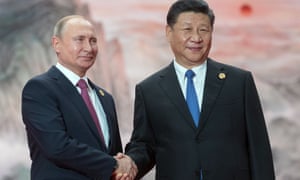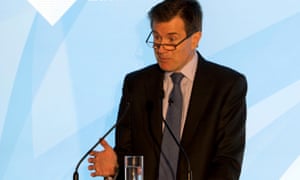Will Bilderberg still be relevant as the future of war is transformed?
This year’s summit is all about war – but what they all want to conquer is artificial intelligence
This year’s Bilderberg summit is a council of war. On the agenda: Russia and Iran. In the conference room: the secretary general of Nato, the German defence minister, and the director of the French foreign intelligence service, DGSE.
They are joined in Turin, Italy, by a slew of academic strategists and military theorists, but for those countries in geopolitical hotspots there is nothing theoretical about these talks. Not when the prime ministers of Estonia and Serbia are discussing Russia, or Turkey’s deputy PM is talking about Iran.
The clearest indication that some sort of US-led conflict is on the cards is the presence of the Pentagon’s top war-gamer, James H Baker. He is an expert in military trends, and no trend is more trendy in the world of battle strategy than artificial intelligence. Bilderberg is devoting a whole session to AI this year – and has invited military theorist Michael C Horowitz, who has written extensively on its likely impact on the future of war.
Q&A
Does Russia present a credible threat to the UK?
Horowitz sees AI as “the ultimate enabler”. In an article published just a few weeks ago in the Texas National Security Review, he quotes Putin’s remark from 2017: “Artificial intelligence is the future, not only for Russia, but for all humankind. Whoever becomes the leader in this sphere will become the ruler of the world.”
Horowitz says “China, Russia, and others are investing significantly in AI to increase their relative military capabilities”, because it offers “the ability to disrupt US military superiority”. Global military domination is suddenly up for grabs – which brings us to the most intriguing item on this year’s Bilderberg agenda: “US world leadership”.
Bilderberg’s most eminent geopolitical sage, Henry Kissinger, will growl this ominous phrase with ancient delight. He has been clanging the funeral bell of American world leadership for decades. Back in 2005 he wrote about how the rise of China would bring about “a substantial reordering of the international system”.
The White House is clearly concerned: sending to Bilderberg the National Security Council’s director for China, Matthew Turpin. Not that this “gravity shift” to the east is something Turpin could talk about in earshot of Trump.
But here’s the thing: this tectonic reshaping of power, in which “the centre of gravity of world affairs” moves from America to China, is a pre-AI concept. The chief executive of Google recently described AI as more significant for humanity than “electricity or fire”. What this “all-encompassing revolution” means for traditional power structures is the possibility of utter transformation. It is not just that world leadership will be passed from the US to China like a baton. It is that the whole structure of world leadership might just melt away, or take a form that no one, not even Kissinger, could foresee.
What this means for Bilderberg is that the system of transatlantic influence and opinion-shaping that the group has spent more than six decades refining might vanish overnight. All the diplomatic machinations of Józef Retinger and Étienne Davignon, all the Rockefeller, Agnelli and Wallenberg power, rendered irrelevant by the disruption of AI.
Little wonder that Bilderberg, in this state of existential angst, is trying desperately to keep up with the latest tech developments: this year discussing “quantum computing” in a session led by Hartmut Neven, the director of Google’s Quantum Artificial Intelligence Lab. The Turin guest list is littered with folk from Google. AI expert Demis Hassabis, who runs Google’s DeepMind project, is already a conference regular. Bilderberg knows that the future lies in hi-tech, so it is grabbing Google with both hands.
In the meantime, having a few proxy wars with Russia is a pleasant way to pass the time. Especially if you run a giant arms company, as several at Bilderberg do. Marcus Wallenberg is chairman of Saab, which makes fighter jets. Giampiero Massolo is chairman of Fincantieri, which makes frigates. And Thomas Enders is chief of Airbus, the seventh biggest arms company in the world. Skirmishes in Estonia would be good for business, if not for Estonia.
Still, the biggest ethical question faced by the summit is not whether to milk the madness of war for profit. Bombing and rebuilding countries, missiles and debt, that’s all fine: that’s just how neoliberalism works. What’s tougher to justify, within a democratic framework, is the practical process whereby conflicts are being debated, behind closed doors, by top policymakers in concert with billionaire industrialists and private sector profiteers. The prime minister of the Netherlands discussing global flashpoints in luxurious privacy with the CEO of Royal Dutch Shell and the chairman of Goldman Sachs International. It’s horrible optics.
At Bilderberg, you’ve got the secretary general of Nato discussing Russia with financiers whose job it is to turn knowledge into dollars. Bilderberg member Sir John Sawers used to run MI6. Now he runs Macro Advisory Partners, helping his clients to navigate “a volatile and fragmenting global landscape” while “maximising opportunity and minimising risk”. He does the same for BP, as a member of its board of directors.
This is what Kissinger has been doing for decades through Kissinger Associates: leveraging information for money. This isn’t how representative democracy is meant to work. It’s how Wall Street works. It’s the geopolitical version of insider dealing: private access to non-public information.
What the politicians at Bilderberg ought to realise, when they take a break from brainstorming war to enjoy the buffet, is that they are the buffet. There’s not much dignity in undermining democracy. But there is a huge pile of money, and for many people that’s enough.






2 opmerkingen:
Fascist New York Times-Fascist Israel -Ties..........what's new......
‘New York Times’ Teams Up with Israel to Smear Slain Medic Razzan al-Najjar as ‘Complex,’ Not Innocent
https://www.globalresearch.ca/new-york-times-teams-up-with-israel-to-smear-slain-medic-razzan-al-najjar-as-complex-not-innocent/5643785
Nonetheless, Times author Herbert Buchsbaum, a desk editor in New York, chimes in: al-Najjar “may have been a more complex person than either side is making her out to be.”
What can the Times mean by “more complex”? That is, she was not only saving lives, but was part of the protest. Apparently there is something “complex” about this and therefore Israel isn’t really guilty of lying, just oversimplifying.
That is obfuscation. Everyone knows what this woman was doing: protesting and saving lives. Calling this “complex” is just the NY Times saying she wasn’t really sweet and innocent. If Russia did this the Times would call it the cynical slander and lie that it is. But since it is Israel they have to make this into a he said/she said debate. There is a “battle” of narratives about al-Najjar, the Times says.
There is no debate. Israel has lied about the al-Najjar case repeatedly. The NYT wants to give some sort of face-saving excuse for this and all they can come up with is this subtle endorsement of the slander about her lack of innocence. The video, Buchsbaum writes, is “an effort to chip away at Ms. Najjar’s image of fresh-faced innocence.”
If the Times really wanted to find out more about Najjar, it would not ape propaganda. It would send out reporters to interview her family and friends. Or they could call B’Tselem to ask its opinion. No, the Times has a deskbound New York man parroting Israeli talking points.
Calling al-Najjar a human shield is a serious charge. Shouldn’t they have asked her mother for a reaction? The family would surely tell you: This is despicable.
Een reactie posten